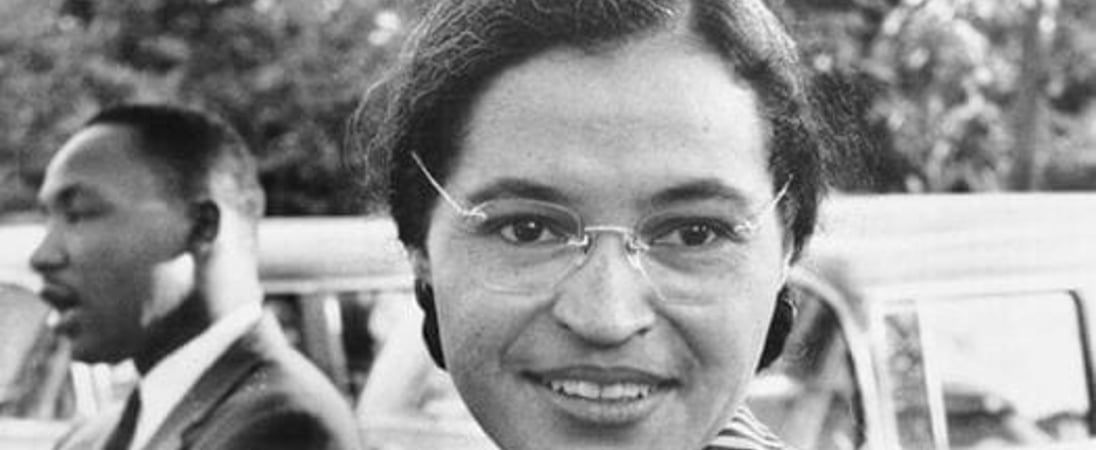
Rosa Parks Day
Rosa Parks Day is when Americans pause to remember the life and legacy of Rosa Parks. The day reflects on Rosa Parks’ selfless work during America’s civil rights movement.
Rosa Parks was known for her short stature and strong will – may she ever be remembered for her efforts.
How to Celebrate Rosa Parks Day
Rosa Parks Day celebrations can be just as empowering as Mrs. Parks herself. Here are some ways to honor Rosa Parks:
Rosa Parks Day Educational Activities
Schools and community centers are crucial in educating about Rosa Parks’ legacy. They often organize detailed programs that include the following:
- Interactive Workshops: Schools may conduct workshops where students can engage in role-playing events from the civil rights era. The activities help them empathize with the historical figures. It also helps them better understand the emotional and societal impacts those events continue to have today.
- Guest Speakers: Invite civil rights activists or historians to share their insights and personal stories. Hearing these stories gives us a new perspective about the fight for racial equality.
- Art Projects: Encourage students to express their interpretations of the civil rights era through art. They might like to create posters or paintings that reflect the themes of Rosa Parks’s life. For a modern twist, they can create AI art reflecting the broader civil rights movement.
Check with your local school district or community college to see what events are in the works.
Community Events
Community events can provide a platform for broader engagement:
- Panel Discussions and Q&A Sessions: These community discussions feature experts on civil rights history. They empower attendees to ask questions and have the most meaningful conversations.
- Cultural Exhibitions: Rosa Parks Day exhibitions showcase artifacts, photographs about Rosa Parks and the civil rights movement. These exhibits, including the Rosa Parks Statute on Capitol Hill, can make a tangible connection to history.
- Film Series: Screen a series of documentaries and films depicting the civil rights movement. Follow up with frank discussions or forums to analyze the themes and historical context presented.
Art and Literature
Digging even deeper into arts and literature can enrich the understanding of Rosa Parks’ impact:
- Book Clubs and Reading Sessions: Organize book clubs focusing on works related to Rosa Parks and the civil rights movement. Encourage group discussions and reflections on the readings.
- Artistic Performances: Host or attend performances like plays, poetry readings, or musical events that draw inspiration from Rosa Parks’ life and the broader struggle for civil rights.
Social Media Awareness
Leveraging social media effectively can amplify the message of Rosa Parks Day:
- Hashtag Campaigns: Use the correct hashtag #RosaParksDay to encourage the sharing of relevant content. This can help in tracking and amplifying the reach of the message.
- Virtual Events: Organize online events. Webinars or live-streamed discussion can help you reach a wider audience of those who cannot attend in-person events.
Volunteer Work
Volunteering can take various forms, such as:
- Community Service Projects: Organize Rosa Parks Day community service projects that address local social justice issues. Draw a parallel to the activism of Rosa Parks.
- Educational Outreach: Volunteer to assist in programs that educate younger generations about racial equality. It’s a chance to make civil rights history a big part of United States civics.
Reflection and Personal Commitment
Encouraging personal reflection and commitment can be deeply impactful:
- Personal Reflection Journals: Encourage individuals to maintain journals where they can reflect on lessons learned about civil rights. Then, ask them to consider how these lessons can be applied to current social issues.
- Commitment Pledges: Create a platform for individuals to make public pledges about actions to combat racial inequality. This pledge is a promise to promote social justice in their daily lives.
Remembering Rosa Parks through these activities honors her memory. Perhaps even more importantly, they reinforce the ongoing commitment to justice she so bravely sat in place for.
History of Rosa Parks Day
Rosa Louise McCauley, who most know as Rosa Parks, was born in Tuskegee, Alabama, on February 4, 1913. Even in her childhood, Parks lived through the realities of segregation. She saw firsthand the impacts of unjustness and racial discrimination.
But she rose to the occasion. She embodied the true American spirit of resistance and activism. These qualities became synonymous with her name.
Her active involvement in the struggle for racial equality garnered national attention on December 1, 1955.
On that fateful day, Parks, who was then a 42-year-old African American seamstress, defied a bus driver’s order when he told her to move out of her seat to make way for a white passenger.
Her arrest became a hot flash in the civil rights movement. The Montgomery Bus Boycott, sparked from her courageous direct action, lasted 381 days. That bus boycott ended only after the United States Supreme Court intervened. Their decision declared segregation on public transport unconstitutional.
The first official Rosa Parks Day was established in California in 2000. The day’s goal was recognition for Parks’ significant impact on the nation’s history. Over the years, Rosa Parks Day has become a time for communities to come together and reflect on awareness of racial equality and civil rights.
Some states, including New York celebrate Rosa Parks Day on February 4, which is her birthday.
Rosa Parks Day FAQs
Why do some states celebrate Rosa Parks Day on different dates?
Some states observe Rosa Parks Day on February 4, her birthday, while others commemorate it on December 1, the day she refused to give up her bus seat.
February 4 highlights her life and legacy as a whole, focusing on her contributions beyond the bus incident.
December 1 emphasizes the event that sparked the Montgomery Bus Boycott and became a defining moment in the Civil Rights Movement.
This dual recognition reflects the breadth of her influence—both as a symbol of resistance and as a lifelong advocate for justice.
What inspired Rosa Parks to take a stand on December 1, 1955?
Rosa Parks’ decision was not spontaneous. She had attended workshops at the Highlander Folk School, a training center for activists fighting for civil rights and labor rights.
The institution prepared leaders to address racial inequality through peaceful protest.
Parks also worked tirelessly for the NAACP as a secretary, documenting cases of racial injustice.
Her upbringing, where she witnessed racial violence and segregation, combined with her activist training, gave her the conviction to resist systemic oppression.
Are there any unusual or international ways people celebrate Rosa Parks Day?
In Japan, some human rights organizations use Rosa Parks Day to promote social justice awareness.
They screen documentaries about the Civil Rights Movement and draw parallels to global struggles against inequality.
In South Africa, Parks’ legacy is honored in schools that teach about her story alongside Nelson Mandela’s activism, fostering discussions about nonviolent resistance.
These celebrations show how her influence transcends borders and inspires global activism for equality and justice.
How did Rosa Parks’ arrest contribute to the rise of Martin Luther King Jr.?
Before Parks’ arrest, Martin Luther King Jr. was a relatively unknown pastor in Montgomery.
The Montgomery Bus Boycott, sparked by her arrest, thrust him into a leadership role as the spokesperson for the movement.
His eloquent speeches and ability to unite communities gained national attention. Without the pivotal moment of Parks’ defiance, King’s rise as a civil rights leader might have been delayed or taken a different path.
Parks’ action was a catalyst for his emergence as a central figure in the struggle for racial equality.
What lesser-known figures supported Rosa Parks during the Montgomery Bus Boycott?
Jo Ann Robinson, a professor and activist, led the Women’s Political Council in organizing the boycott.
She had long been advocating against bus segregation and was instrumental in spreading the word about the boycott through thousands of leaflets printed overnight.
Attorney Fred Gray represented Parks and played a critical role in the legal battle that followed.
These figures, among others, ensured that the boycott was strategically planned and executed with precision.
Did Rosa Parks face backlash for her activism after the bus boycott?
Yes, Rosa Parks and her family faced severe consequences. They lost their jobs and received numerous threats.
Economic hardship forced them to relocate to Detroit, where Parks continued her activism.
She worked alongside figures like John Conyers, a U.S. Representative, to fight for racial and economic justice.
Despite the backlash, Parks never wavered in her commitment to equality, demonstrating remarkable courage.
Are there any myths about Rosa Parks that persist today?
Many believe Rosa Parks refused to give up her seat simply because she was physically tired.
Parks clarified that her decision was a deliberate act of protest against racial injustice. This misconception oversimplifies her bravery and activism, reducing her to a passive participant rather than a bold resistor.
Additionally, some think her act was spontaneous, but Parks was deeply involved in activism for years before that day.
What role did music and art play in celebrating Rosa Parks?
Music and art have honored Rosa Parks in unique ways. For example, OutKast released a song titled “Rosa Parks” in 1998, blending her legacy with modern struggles.
Visual artists have created murals worldwide to depict her courage, particularly in urban spaces.
Art festivals often feature performances, such as reenactments of her arrest, to keep her story alive. These creative tributes ensure new generations connect with her story emotionally.
How did Rosa Parks contribute to causes beyond racial justice?
Parks fought for economic and social justice in Detroit. She worked on housing discrimination issues and promoted education for underprivileged youth through the Rosa and Raymond Parks Institute for Self Development.
She believed equality extended beyond race, advocating for all marginalized groups to receive fair treatment and opportunities.
What is the significance of the Rosa Parks Transit Center in Detroit?
The Rosa Parks Transit Center in Detroit is more than a transportation hub. It symbolizes her lasting impact on public access and equality.
The center, opened in 2009, serves thousands daily, standing as a tribute to her efforts to desegregate public transit.
Its modern design, combined with its historical significance, makes it a unique memorial that blends functionality with homage.
Also on ...
View all holidaysNational Cookie Cutter Day
Transform your cookies with fun shapes and designs. Cookie cutters are a must-have tool for any baking enthusiast.
Walt Disney Day
Binge some favorite childhood movies, plan a trip to “the most magical place on earth” or enjoy some Disney-themed activities like baking and crafting.
National Christmas Lights Day
Creating a luminous wonderland that brightens the darkest season, celebrating with glimmering decorations that adorn the night.
Wear a Dress Day
From flowing sundresses to elegant evening gowns, there's a dress for every occasion. So twirl, dance, and let your inner diva shine in a dress that makes you feel like a million bucks!








